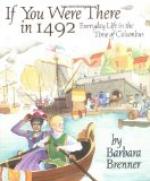While Antonio de Torres was absent from Hispaniola, laying these propositions before Los Reyes, Columbus was busy about the affairs of the colony, which were in a most distracted state. Scant fare and hard work were having their effect; sickness pervaded the whole armament; and men of all ranks and stations, hidalgoes, people of the court and ecclesiastics, were obliged to labour manually under regulations strictly enforced. The rage and vexation of these men, many of whom had come out with the notion of finding gold ready for them on the sea shore, may be imagined; and complaints of the admiral’s harsh way of dealing with those under him (probably no harsher than was absolutely necessary to save them), now took their rise, and pursued him ever after to his ruin. A mutiny, headed by Bernal Diaz, a man high in authority, was detected and quelled before the mutineers could effect their intention of seizing the ships. Diaz was sent for trial to Spain. The colonists, however, were somewhat cheered after a time by hearing of gold mines, and seeing specimens of ore brought from thence; and the admiral went himself and founded the Fort of St. Thomas, in the mining district of Cibao. But the Spaniards gained very little real advantage from these gold mines, which they began to work before they had consolidated around them the means of living; in fact, dealing with the mines of Hispaniola as if they had been discovered in an old country, where the means of transit and, supplies of provisions can, with certainty, be procured.
Desire for discovery.
There was also another evil, besides that of inconsiderate mining, and, perhaps, quite as mischievous a one, which stood in the way of the steady improvement of these early Spanish colonies. The Catholic sovereigns had unfortunately impressed upon Columbus their wish that he should devote himself to further discovery, a wish but too readily adopted and furthered by his enterprising spirit. The hankering of the Spanish monarchs for further discovery was fostered by their jealousy of the Portuguese. The Portuguese were making their way towards India, going eastward. They, the Spaniards, thought they were discovering India, going westward. The more rapidly, therefore, each nation could advance and plant its standard, the more of much-coveted India it would hereafter be able to claim. Acting upon such views, Columbus now proceeded onwards, bent upon further discovery, notwithstanding that his little colonies at Isabella and St. Thomas must have needed all his sagacity to protect them, and all his authority to restrain them.
A council appointed.
He nominated a council to manage the government during his absence, with his brother Don Diego as president of it; he appointed a certain Don Pedro Margarite as captain-general; and then put to sea on the 24th of April, 1494.




